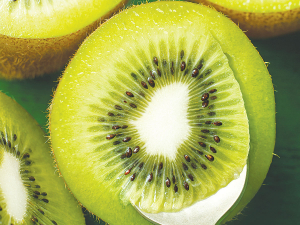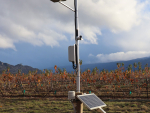The old adage of 'an apple a day keeps the doctor away' may now have to be changed to 'a kiwifruit or two helps you to snooze'.
This comes after new research shows that eating two green kiwifruit a day can improve sleep quality and mood, and leave people feeling refreshed in the morning.
Riddet Institute PhD candidate Alex Kanon and his supervisor, Dr Sharon Henare from Massey University, researched the benefits of eating two kiwifruit in the evening. They found an immediate positive effect, with participants experiencing a better sleep the same night. The research was conducted over the past two years.
The Riddet Institute is a Centre of Research Excellence (CoRE), hosted by Massey University in Palmerston North, focusing on advanced food research.
"Other studies have looked at sleep and kiwifruit over a longer period of daily consumption - around 4 weeks. We wanted to see if we could see an acute effect - can you eat kiwifruit now and feel the benefits straightaway," Kanon says.
The research in healthy men (half with poor sleep and half with good sleep) saw participants eating an evening meal, followed by either two fresh green kiwifruit (without skin) or two powdered dried kiwifruit (with skin) or water. The research team then measured sleep quality, mood and urinary biomarkers.
"We found that regardless of whether you normally have good or bad sleep, kiwifruit had an immediate positive impact on different aspects of sleep quality and mood," Kanon explains.
Sleep is essential for the cellular repair of the body and can affect our immune function, psychology and increase the risk of obesity, type 2 diabetes and cardiovascular disease.
One night of sleep disturbance can affect a person's ability to concentrate, which may increase technical errors and decrease overall mood the following day.
Both groups felt that it was easier to wake up in the morning and they felt less sleepy after eating the kiwifruit. There were also improvements in their psychological wellbeing in the morning, with significant improvements in positive mode, esteem and vigour.
"Seratonin plays a central role in the regulation of sleep-wake cycles," Kanon adds. "We saw significant increases in seratonin metabolite the morning after participants ate fresh or dried kiwifruit."
The research was funded by the High-Value Nutrition National Science Challenge and supported by Zespri International Limited, who contributed fresh Zespri Green Kiwifruit.
"The study shows there is potential for New Zealand kiwifruit-based products with health messaging related to sleep quality and mood, while also potentially bringing increased economic benefits for kiwifruit growers," explains Joanne Todd, high-value nutrition challenge director.
"We know there is crosstalk between the gut and the brain and these results highlight the importance of that link," says Paul Blatchford, Zespri innovation manager. "The study findings are encouraging and contribute to the growing body of evidence of kiwifruit's impact on mood and wellbeing."
This new research will be published in Frontiers in Nutrition, section Nutrition, Psychology and Brain Health.


















